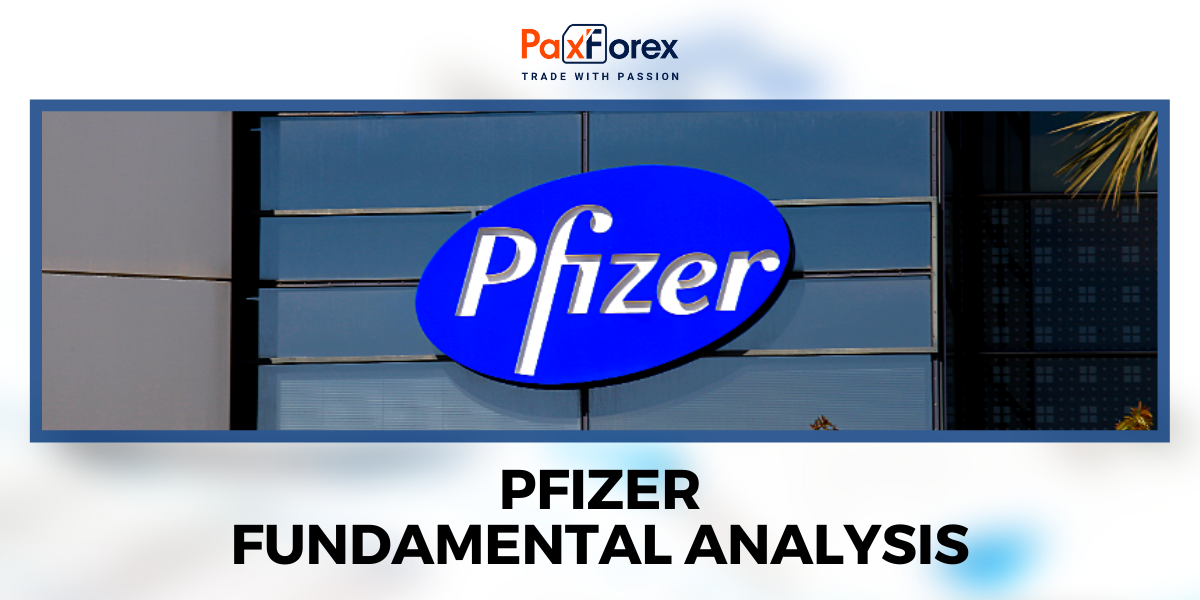
Source: PaxForex Premium Analytics Portal, Fundamental Insight
Although the COVID-19 pandemic has faded from the forefront for most investors, Pfizer continues to grapple with the aftermath of its record-breaking vaccine sales and earnings in 2021 and 2022. The stock has declined by about 53% from its peak, as the market questions whether the pharmaceutical giant can discover its next blockbuster drug.
However, there’s a silver lining: Pfizer’s recent results indicate a rebound in growth. Sales momentum from several new product launches suggests a brighter outlook. With a tempting dividend yield of 5.8%, could Pfizer stock be a valuable addition to your portfolio? Here’s what you need to consider.
Pfizer's current challenge is to restore investor confidence by demonstrating that its long-term strategy is back on course. Fortunately, the company’s second-quarter earnings for the period ending June 30 suggest progress in that direction. Revenue growth turned positive, increasing by 3% year over year, and an even more impressive 14% when excluding the declining sales from the Comirnaty and Paxlovid COVID-19 programs.
Growth this quarter was further boosted by contributions from Seagen, which Pfizer acquired in late 2023, and strong demand for key products like Vyndaqel and Eliquis. Sales of Nurtec, an acute migraine medication, have also seen an uptick.
A key focus for Pfizer has been generating financial efficiencies through cost realignment, with a plan to achieve at least $4 billion in savings by year’s end. This initiative seems to be yielding results. Second-quarter adjusted earnings per share (EPS) of $0.60 exceeded the average Wall Street estimate by $0.14.
This performance enabled management to raise its full-year guidance: Pfizer now anticipates 2024 adjusted EPS between $2.45 and $2.65, up from the previous midpoint estimate of $2.25. The revenue forecast has also been revised upwards to a range of $59.5 billion to $62.5 billion, reflecting a 4% increase at the midpoint over 2023.
The market tends to reward companies that successfully navigate through tough times, and Pfizer appears to be well-positioned for a strong comeback after a challenging few years. The appeal of investing in Pfizer starts with its leadership in the pharmaceutical sector and its long-standing reputation for innovation.
What stands out about Pfizer is its attractive valuation, with a forward price-to-earnings (P/E) ratio of just 11 times the company’s projected 2024 earnings per share (EPS). Additionally, Pfizer boasts one of the highest dividend yields among global drugmakers, currently at 5.8% based on its quarterly dividend of $0.42 per share. This yield surpasses that of peers like AbbVie, which offers 3.3%, GSK at 3.8%, and even Bristol Myers Squibb at 5.1%.
The key takeaway from Pfizer's second-quarter earnings report is that the company is finally moving beyond the volatility of the late-pandemic period. I believe Pfizer shares merit a buy rating.
Several drug programs are expected to report clinical study results by the end of the year, including those targeting weight management, oncology, and hematology. These therapeutic candidates have the potential to act as catalysts for a stock rally. However, it's important to consider that any setbacks in Pfizer’s pipeline could introduce volatility, posing risks to the stock.
In conclusion, Pfizer seems undervalued given the long-term opportunities within its current portfolio and drug pipeline. The company’s ability to return to a profitable growth trajectory bodes well for its stock. For investors with a long-term perspective, Pfizer could be a solid choice within a diversified portfolio.
As long as the price is above 27.00, follow the recommendations below:
- Time frame: D1
- Recommendation: long position
- Entry point: 28.441
- Take Profit 1: 30.00
- Take Profit 2: 31.00
Alternative scenario:
If the level of 27.00 is broken-down, follow the recommendations below:
- Time frame: D1
- Recommendation: short position
- Entry point: 27.00
- Take Profit 1: 26.00
- Take Profit 2: 25.00













